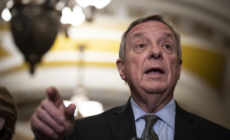-
Nolan Arenado Blocks Trade To Perennial American League Contender: Report - 12 mins ago
-
Summer X Games are leaving Southern California, headed to Sacramento - 39 mins ago
-
Florida Charges Man Suspected of Trump Assassination Plot - 41 mins ago
-
Pardoning Oath Keepers Leader Stewart Rhodes Would Be ‘Frightening’: Judge - 46 mins ago
-
FBI agents search home of L.A. deputy mayor over City Hall bomb threat - about 1 hour ago
-
AAA Predicts Millions to Trave for Christmas Holiday. Here’s Everything You Need to Know - about 1 hour ago
-
What to Know About the Charges Against Luigi Mangione - about 1 hour ago
-
A Look At The Kardashian-Jenner Christmas Parties Through The Years - 2 hours ago
-
Zelensky to Meet With E.U. Leaders to Discuss Ukraine’s Future - 2 hours ago
-
Democrat Mocks CNN After Questioning Pay Raise for Congress - 3 hours ago
Assad’s Syria Was a Narco-State. Its New Rulers Must Just Say No | Opinion
In the shadow of the Syrian civil war, the drug trade emerged as a grim cornerstone of Bashar al-Assad’s regime. Known for its stimulant effects, Captagon became Syria’s largest illicit export, generating an estimated $10 billion annually—a figure surpassing the country’s official GDP. This staggering economic reliance highlights the former regime’s transformation of Syria into a narco-state, where high-ranking officials, including Assad’s own brother, Maher al-Assad, reportedly managed the drug’s production and global distribution.
By the mid-2010s, Syria accounted for 80 percent of the world’s Captagon supply, a dominance that reshaped the dynamics of conflict and crime in the region. The Islamic Republic of Iran, an ally of Assad, facilitated this trade, ensuring its proxies, such as Hezbollah in Lebanon, had access to a steady stream of funding. This drug-fueled economy not only stabilized Assad’s regime amid economic collapse but also enabled Iran’s broader regional ambitions, feeding conflicts across the Middle East.
The main group now controlling Damascus, Hayat Tahrir al-Sham (HTS), under Mohammed al-Jolani, is positioning the dismantling of the Captagon trade as a pivotal objective. Al-Jolani’s recent condemnation of the Assad regime painted a vivid picture of Syria under Assad’s rule: a “farm for Iran’s greed.” For HTS and others seeking to redefine Syria’s future, uprooting this criminal enterprise represents more than an economic or moral imperative—it is a reclamation of sovereignty. However, consolidating power in a fractured and war-torn nation may pose challenges for HTS, including resistance from entrenched networks with vested interests in the trade.

ARIS MESSINIS/AFP via Getty Images
The dismantling of Syria’s Captagon industry would disrupt Iran’s ability to channel funds to its regional proxies. For groups like Hezbollah, which have historically benefited from this trade, such a shift could significantly curtail their operations. Iran’s influence in Syria, already diminished after years of war, would face further erosion.
Syria’s Captagon crisis has long spilled across its borders, with Jordan being one of the most affected neighbors. The influx of Captagon into Jordan has escalated into a national security threat, prompting Amman to take unprecedented military action. In 2024 alone, Jordan conducted multiple airstrikes within Syrian territory, targeting drug warehouses and key operatives. Strikes in Al-Ghariya and Shaab, for example, underscore a new phase of regional cooperation against the drug trade.
These actions reflect a broader understanding among Syria’s neighbors: Captagon is not merely a Syrian problem but a regional crisis demanding collective action. The Gulf states, too, have expressed growing alarm at the proliferation of the drug, as addiction rates rise among their populations. These developments hint at the potential for an international coalition aimed at dismantling Syria’s narco-economy.
Dismantling Syria’s Captagon trade will be a monumental task. The industry is deeply embedded within the country’s war-torn economy, with production networks spanning the country. While HTS and anti-Assad forces may seek to eliminate the trade, they will face resistance from criminal syndicates and foreign actors. Regional cooperation will be essential, but so, too, will be a multi-faceted approach addressing the economic and social conditions that allowed this trade to flourish.
Stabilizing Syria’s economy, providing alternative livelihoods, and addressing the root causes of its descent into a narco-state will be crucial. Lessons from other contexts, such as Colombia’s long battle with the cocaine trade, suggest that comprehensive strategies—combining military, economic, and social interventions—are required for lasting success. Without these measures, the Captagon trade could adapt and persist, shifting to new actors or regions.
The fight against the Captagon trade represents a critical juncture for Syria. For the governing body in the post-Assad era, it is an opportunity to demonstrate a commitment to a new vision for the country, free from the reliance on drug trade revenues or external manipulation. For Syria’s neighbors and the international community, it is a chance to address a transnational crisis with far-reaching consequences.
Yet, this moment also serves as a sobering reminder of the complexities of rebuilding a war-torn nation. The Captagon trade, like the Syrian conflict itself, is a symptom of deeper systemic failures—failures that will require sustained and collaborative efforts to overcome.
It is unclear if Syria’s new masters will be able to steer the country away from the shadow of corruption and exploitation. Whether they can succeed in dismantling the Captagon empire will not only define their legitimacy but also shape the course of Syria’s recovery. The road ahead is fraught with challenges, but the stakes—regional security and the lives of countless individuals—demand nothing less than unwavering resolve.
John Spencer is chair of urban warfare studies at the Modern War Institute (MWI) at West Point, codirector of MWI’s Urban Warfare Project and host of the “Urban Warfare Project Podcast.” He served for 25 years as an infantry soldier, which included two combat tours in Iraq. He is the author of the book” Connected Soldiers: Life, Leadership, and Social Connection in Modern War” and co-author of” Understanding Urban Warfare.“
The views expressed in this article are the writers’ own.
Source link




















